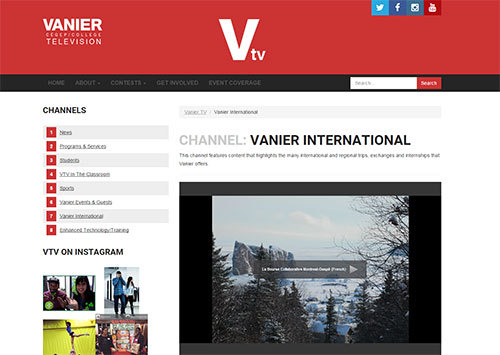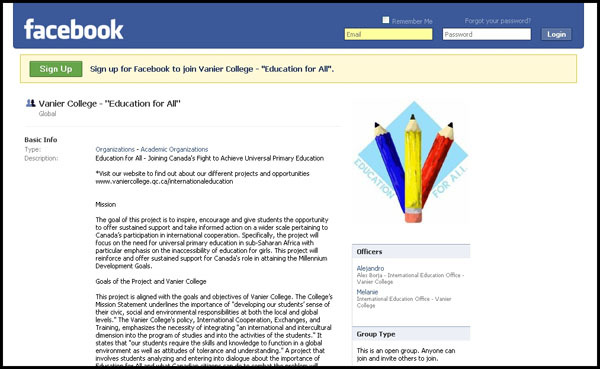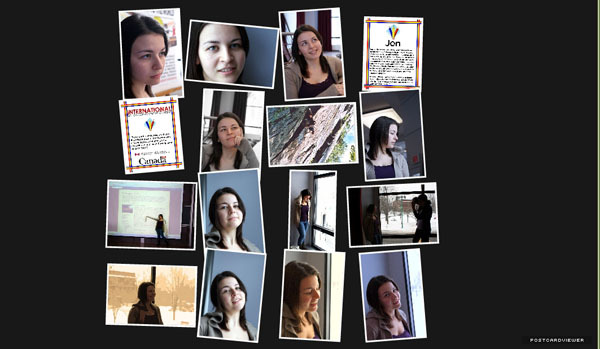Our goal was to create bridges of understanding that lead to action for change in Canada, to change the relationship between rich and poor countries and undermine the structural impediments to development.
by Doug Miller, Study Trip Leader and Vanier teacher in an excerpt from ‘Welcome to my Village’
In order to engage students and teachers alike by using technology to create awareness about global issues as well as to inform students about different international involvement opportunities available to them, Vanier’s International Education Office has built a website. First hand accounts of visits bring the reality of Vanier’s international profile back into the school. The quote above is a taste of the intensity that leaps from these on-line accounts. To draw attention to the issues surrounding education in the developing world, the site contains a Video of the Week feature whose links to a different video on You Tube each week highlight the difficulties that communities face in achieving Universal Primary Education. These videos can be used to communicate the reality of this situation in the classroom.
 VTV website
VTV website
Harnessing Facebook’s Features
Taking advantage of Facebook‘s popularity, an online network on the site features our Canadian International Development Agency’s (CIDA) sponsored project: Education for All, a project featuring 8 Vanier students who will take part in a study trip in Malawi during Summer 2009. Our Education for All Facebook group helps interested students connect with the project by watching related videos and pictures. This project is aligned with the goals and objectives of Vanier College. The College’s Mission Statement underlines the importance of “developing our students’ sense of their civic, social and environmental responsibilities at both the local and global levels.” The Vanier College’s policy, International Cooperation, Exchanges, and Training, emphasizes the necessity of integrating “an international and intercultural dimension into the program of studies and into the activities of the students.”
More importantly, Facebook also redirects users to our website where the issue is explained at length, and more features can be explored such as photos from various student trips. When a group of students and teachers went to Malawi on the Vanier AIDS Action in Africa project in January 2008, a slideshow of some of the best pictures was made which can be accessed from our site as well.
 The International Education Office’s Facebook Group
The International Education Office’s Facebook Group
Making Pictures Communicate the Excitement
Realizing how students enjoy photographs online, I decided to add something quite new to our site – photographs featuring each of the students who would be participating in the Malawi Study Trip in the summer of 2009. With a standard digital camera, volunteers and I tried to capture the essence of each participant. Once the pictures were selected, the fun started. Editing the pictures was less of a challenge than I thought. I found a few features in Photoshop and Picasa that allowed me to “improve” the look of the pictures, such as “retouch” and “I am feeling lucky”. Picasa belongs to the Google family. It is easy to find and easier to install. It imports and distributes pictures into very accessible folders. As well, its formatting options are simple to use. Picasa can accent teaching content with professional looking pictures.
 Student Photo Profiles
Student Photo Profiles
Once the picture editing was completed, I had to face the challenge of displaying these pictures. Fortunately, I found PostcardViewer and was able to display them in an interactive style. For those of us who have been frustrated while using Adobe Flash CS3 to display pictures, PostcardViewer is a great option. It is free, easy to use, available to all and compatible with most photo display software. Moreover, it permits its creators to change a few display features such as border colour, background colour, zoom size and others. The result is a professional looking picture displayed in a dynamic and interactive fashion that attracts visitors to a site. Click here and click on the pictures on the link to see how PostcardViewer displays the photos of our students.
The Power of Words
Once the students are visiting our site, we want them to be able to have the opportunity to learn about various international issues. Students’ own writing is often more accessible to other students than the writing of experts so we have included students’ stories of what they learned in Malawi, for example, during their Study Trip in January, 2009.
I learned more about myself on my eighteen day trip to Malawi than I have in the last eighteen years. As a student whose passion is African culture and history, I went to Africa with a number of expectations. My acquired knowledge of the continent served as a crucial grounding tool. However, no textbook, teacher, or transcript could have prepared me for what I saw in Malawi those two weeks in January.
This excerpt from ‘The Sweetest Thing’ a journal by Alexandra Abrol, Social Sciences student, demonstrates the pedagogical worth of these experiences. Click here to read this and other students’ compelling stories. The site also contains more serious reports, again written by our students as well as members of the staff. Click here to read these documents. Additionally, we understand that the study trip is an experience that starts during the selection process and lasts beyond the return date. The accounts of this process can be found in the students’ journals. All participants have created a blog using Blogger, a simple and free blog publishing tool from Google. Vanier students have been invited to read along as our participants undertake their African study trip.
A Valuable Learning Object
To encourage students and teachers to return to our site, we are constantly updating it for use as a reference and learning tool. Various ways are included for the Vanier community to take action internationally. We have also listed organizations like the Farha Foundation and WUSC that provide opportunities to get involved.
Furthermore, we support teachers preparing for student trips. A wealth of information has been made available to them to ensure a successful trip. Everything from policies and procedures to previous student trip accounts can be accessed. Selections include journals of architectural trips to Chicago, the heartland of skyscraper development, and to New Mexico to work for Habitat for Humanity as well as an International Business and Commerce trip to Greece. The trips outlined on the site demonstrate the value that travel brings to Vanier’s courses.
In summary, Vanier’s International Education website engages, attracts, and informs visitors. Google Analytics indicates our growing readership. Also, by linking our site to TakingITGlobal a social networking site for youth interested in global opportunities, we have increased our readership even more. For example, TakingItGlobal last month reported an additional 300 visitors to our site.
Use our Reader Response Feature to share your views on putting IT into international travel programs with your colleagues!

